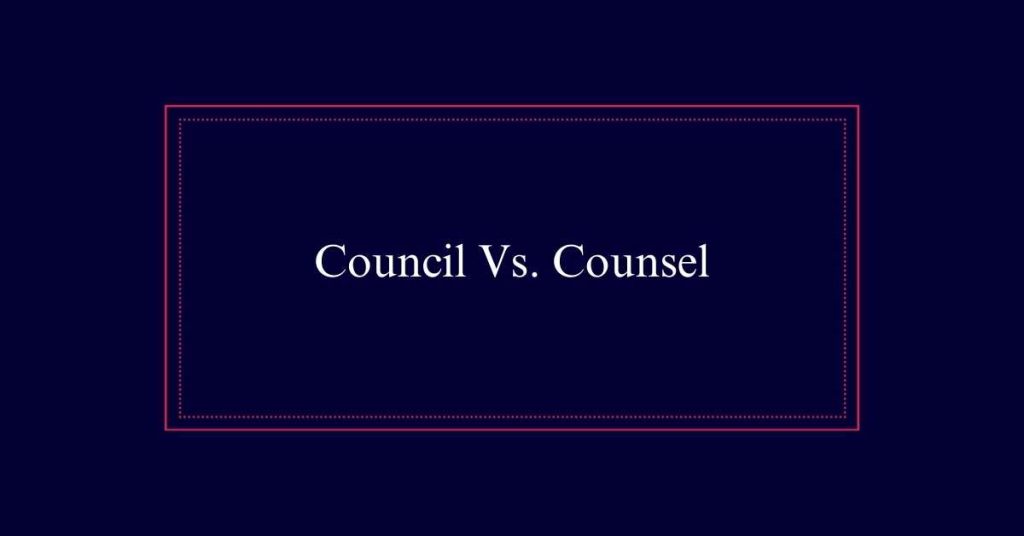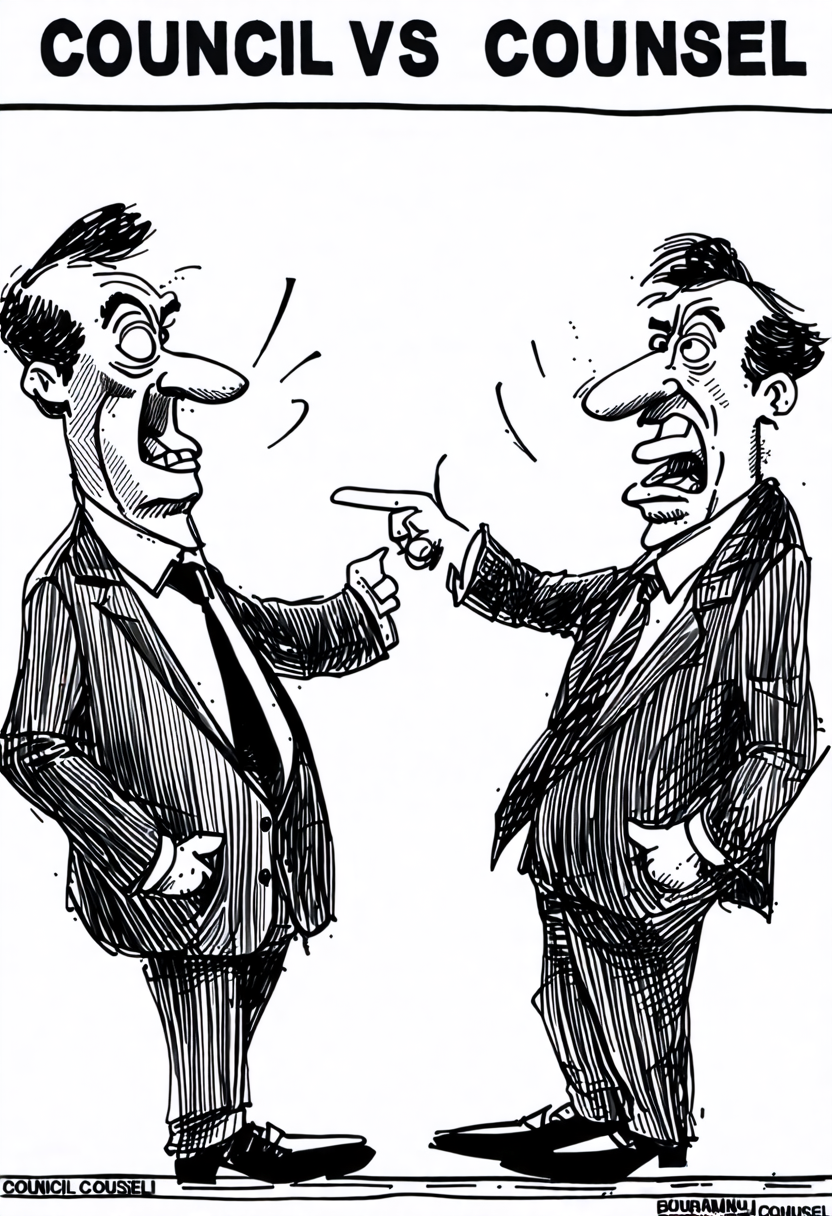Council Vs. Counsel
‘Council’ and ‘counsel’ are often confused due to similar pronunciation but have distinct meanings. ‘Council’ refers to a group of people assembled for consultation or advice on administrative or legislative matters. Examples include a city council or advisory council. ‘Counsel’ refers to advice given, specifically in legal contexts, or to the legal advisers themselves, such as a lawyer.
The verb ‘counsel’ means to provide guidance or advice. The key difference is that a council is an assembly or group, while counsel provides advice or legal support.
Definition of Counsel
Counsel refers to advice or instruction provided to guide someone’s decisions or actions. In broader contexts, it encompasses opinions or deliberations aimed at helping an individual or organization make informed choices.
In the legal domain, counsel signifies a legal adviser or advocate who offers professional guidance on matters of law. As a verb, to counsel someone means to provide them with advice or recommendations, particularly in challenging or complex situations. For instance, one might say, ‘I should have listened to the counsel of my parents,’ underscoring the value of experienced advice.
Definition of Council
While counsel focuses on providing advice or legal guidance, a council is a group of individuals convened to advise, consult, or deliberate on administrative or legislative matters.
Councils are typically formed to address issues within a specific domain, such as local government, education, or corporate governance. They may be temporary or permanent bodies, depending on their purpose.
Councils play an essential role in decision-making processes by offering diverse perspectives and expertise. For instance, a city council deliberates on matters affecting the municipality, such as budgeting, public safety, and urban planning.
Legal Context of Counsel
In legal settings, the term ‘counsel’ refers to a qualified legal adviser or advocate who provides advice and represents clients in court. This role is essential in ensuring that individuals receive fair representation and understand their legal rights and obligations.
Counsel can be involved in various aspects of the legal process, including offering pre-trial advice, negotiating settlements, and presenting cases during trials. The term can also extend to collective legal advisers, such as ‘legal counsel’ in a corporate environment, where they guide the company on legal matters and compliance.
Administrative Role of Council
A council typically serves as a governing body responsible for making decisions on administrative, policy, and legislative matters. Composed of elected or appointed members, councils manage a range of issues from municipal budgets to local ordinances. They play a pivotal role in shaping community policies and ensuring compliance with regulatory frameworks.

Councils also engage with the public, often holding meetings to gather input and foster transparency. This collective decision-making process aims to address the needs and concerns of the community they serve. Additionally, councils oversee various administrative functions such as urban planning, public safety, and infrastructure development.
Counsel as a Verb
Counsel, when used as a verb, refers to the act of giving advice or guidance. This action is often associated with professional settings, such as legal or psychological contexts, where expert advice is sought.
For instance, an attorney may counsel a client on legal strategies, or a therapist may counsel an individual on personal issues. The term underscores the process of providing informed recommendations to aid decision-making. Unlike casual advice from a friend, counseling implies a level of expertise and formality.
Examples of Counsel
Many historical and literary figures have emphasized the importance of seeking counsel in various contexts. For example, J.R.R. Tolkien’s characters often seek counsel from wise Elves, highlighting the value of thoughtful advice.
Similarly, in legal contexts, counsel refers to a lawyer or legal adviser. An example of this is found in courtrooms where defendants rely on the expertise of their legal counsel to navigate complex legal systems.
In everyday life, individuals frequently seek counsel from trusted friends or mentors to make informed decisions. Shakespeare also underscores this in his works, where characters often deliberate and seek counsel before taking action.
Examples of Council
Local governments often rely on councils to make important administrative and legislative decisions. These councils serve various functions and address a range of issues, from urban planning to community welfare. Below are examples of different types of councils and their roles:
| Council Type | Function | Example |
|---|---|---|
| City Council | Urban planning and zoning | Approving new building projects |
| School Council | Educational policies | Implementing curriculum changes |
| Advisory Council | Consultant roles | Providing expert advice on environmental issues |
| Executive Council | High-level decision making | Overseeing governmental strategies |
Key Differences
Often, the key differences between council and counsel lie in their definitions and applications. Understanding these distinctions is essential for accurate communication.
- Council: This term refers to a group of individuals convened to deliberate, consult, or advise on administrative or legislative matters. It is always used as a noun.
- Counsel: This can denote advice or guidance, particularly in legal contexts, and it can function as both a noun and a verb. As a noun, it represents a legal adviser; as a verb, it means to give advice.
- Usage: Council is typically associated with decision-making bodies, while counsel involves providing expert advice or legal representation.
Applications in Governance
Understanding the distinctions between council and counsel is essential, particularly when examining their roles in governance. Councils are deliberative bodies that make decisions on administrative, legislative, or policy matters, while counsel refers to legal advice or advisors. In governance, city councils, for instance, address community concerns and enact local laws. Conversely, legal counsel offers guidance on regulatory compliance and legal matters.
Here’s a comparative table illustrating their applications in governance:
| Aspect | Council | Counsel |
|---|---|---|
| Definition | Deliberative body | Legal advice or advisors |
| Function | Decision-making | Providing legal guidance |
| Example | City council meetings | Legal counsel consultations |
| Role in Governance | Enacts local laws | Ensures regulatory compliance |
| Usage | Always a noun | Can be a noun or verb |
Seeking Legal Counsel
Frequently, individuals seek legal counsel to navigate complex legal issues and guarantee compliance with the law. Legal counsel provides the expertise needed to understand intricate regulations, represent clients in court, and offer strategic advice for legal challenges.
This professional support is essential in various scenarios, including:
- Contract Disputes: Legal counsel assists in resolving disagreements over contractual obligations, ensuring fair outcomes.
- Criminal Defense: When facing criminal charges, having a skilled legal adviser can be vital for defending one’s rights.
- Estate Planning: Legal experts help in drafting wills and trusts, ensuring that an individual’s wishes are honored after their passing.







